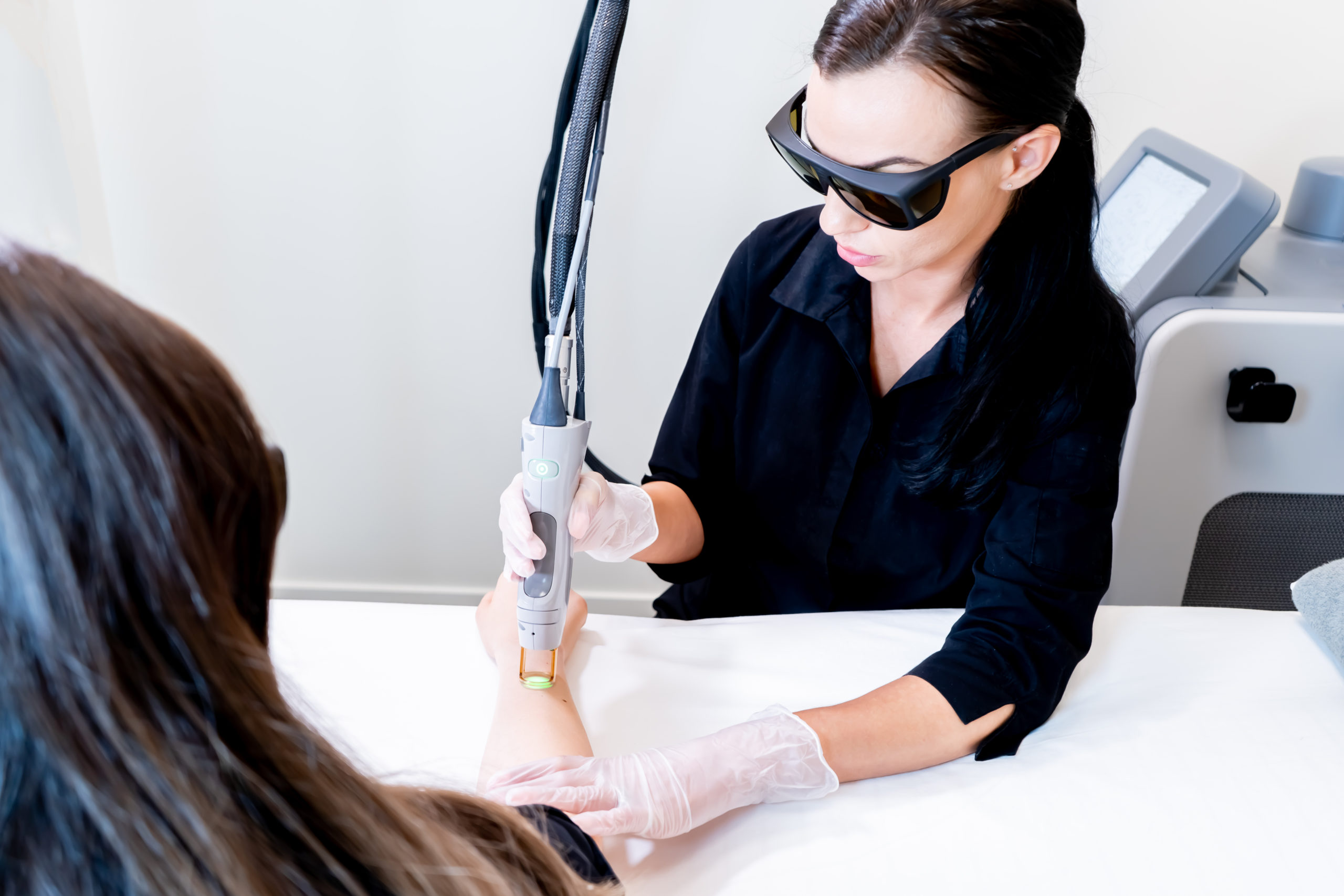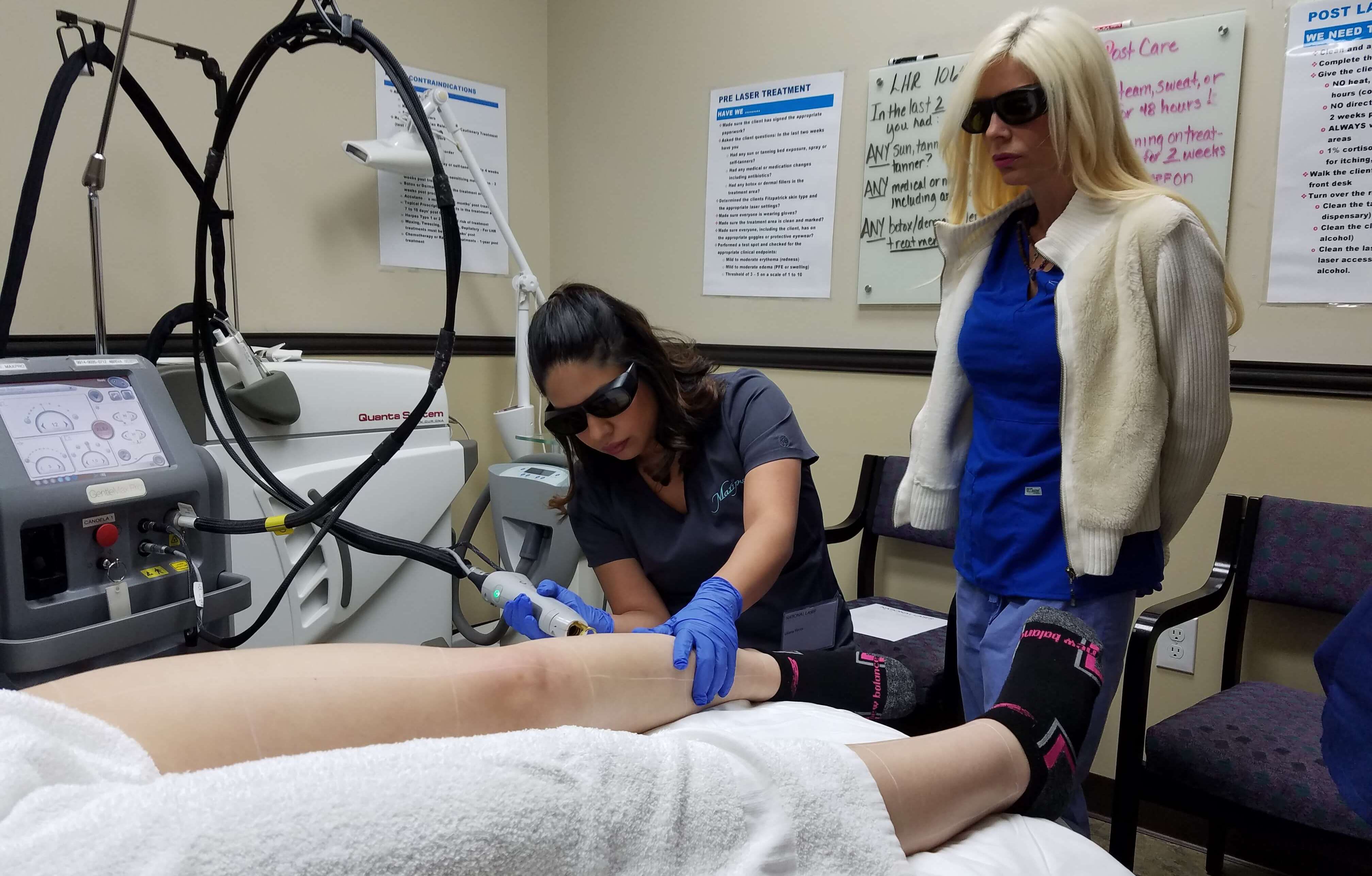

FAQs
How Much Do Laser Hair Removal Techs Make
Modified: August 5, 2023
Find out the average earnings of laser hair removal technicians and get answers to other general questions in this informative guide.
(Many of the links in this article redirect to a specific reviewed product. Your purchase of these products through affiliate links helps to generate commission for Under-tec.com, at no extra cost. Learn more)
Table of Contents
- Introduction
- What is Laser Hair Removal?
- The Role of Laser Hair Removal Technicians
- Education and Certification Requirements for Laser Hair Removal Technicians
- Job Responsibilities of Laser Hair Removal Technicians
- Typical Work Settings for Laser Hair Removal Technicians
- Average Salary of Laser Hair Removal Technicians
- Factors that Influence the Salary of Laser Hair Removal Technicians
- Job Outlook for Laser Hair Removal Technicians
- Conclusion
Introduction
Laser hair removal has emerged as a popular and effective method for achieving long-lasting hair reduction. Many individuals are turning to this innovative procedure to eliminate unwanted hair from various parts of their bodies. As the demand for laser hair removal continues to grow, so does the need for skilled professionals who can perform this procedure safely and effectively. This has created a lucrative career path for laser hair removal technicians.
In this article, we will explore the role of laser hair removal technicians and provide insights into their job responsibilities, education requirements, and average salaries. We will also delve into the factors that influence their earning potential and examine the job outlook for those considering a career in this field.
Laser hair removal involves the use of advanced laser technology to target and destroy the hair follicles, resulting in permanent hair reduction. The procedure is safe, efficient, and offers long-lasting results, making it an attractive option for individuals seeking a more permanent solution to unwanted hair. By selectively targeting the melanin in the hair follicles, the laser is able to destroy the follicles without causing significant damage to the surrounding skin.
As laser hair removal gains popularity, the role of laser hair removal technicians becomes increasingly important. These professionals are trained to operate the laser equipment and perform the procedure safely. They play a crucial role in ensuring that the treatment is administered correctly and that the desired results are achieved. Additionally, laser hair removal technicians are responsible for educating patients on pre and post-treatment care, managing treatment schedules, and maintaining accurate records.
To become a laser hair removal technician, individuals must undergo specialized training and certification. This typically involves completing a laser hair removal program at an accredited institution or obtaining certification from a recognized professional organization. The training covers various topics, including laser physics, safety protocols, skin anatomy, and client consultation. By acquiring the necessary knowledge and skills, laser hair removal technicians can confidently perform the procedure and provide exceptional care to their clients.
In the following sections, we will explore the education and certification requirements for laser hair removal technicians, delve into their typical job responsibilities, and examine the average salary range for professionals in this field. We will also discuss the factors that impact their earning potential and examine the job outlook for laser hair removal technicians.
What is Laser Hair Removal?
Laser hair removal is a non-invasive cosmetic procedure that uses concentrated beams of laser light to remove unwanted hair from various parts of the body. It offers a more long-term solution compared to traditional hair removal methods like shaving, waxing, or tweezing. By targeting the pigment in the hair follicles, the laser damages the follicles, inhibiting future hair growth.
The procedure works by emitting a controlled beam of light that is absorbed by the melanin, or pigment, in the hair follicles. The heat from the laser damages the follicles, disrupting their ability to produce new hair. Over time, this leads to a significant reduction in hair growth in the treated areas.
Laser hair removal is a versatile treatment that can be performed on various areas of the body, including the face, bikini line, legs, arms, back, and chest. It is suitable for both men and women who want to achieve long-lasting hair reduction.
One of the key advantages of laser hair removal is its precision. The laser selectively targets dark, coarse hairs while leaving the surrounding skin undamaged. This makes it a safe and effective option for individuals with different skin types.
It’s important to note that laser hair removal is not a one-time treatment and typically requires multiple sessions to achieve optimal results. This is because hair grows in different stages, and the laser is most effective when targeting hair in the active growth phase. The exact number of sessions needed depends on various factors, such as the treatment area, hair color, and thickness.
One common misconception about laser hair removal is that it guarantees permanent hair removal. While the procedure does offer long-lasting results, it may not completely eliminate all hair. Instead, it leads to a significant reduction in hair growth, allowing individuals to enjoy smoother, hair-free skin for extended periods.
Overall, laser hair removal provides a convenient and effective solution for individuals looking to reduce unwanted hair. With advancements in technology and increased accessibility, this procedure has become a popular choice for those seeking a more permanent hair removal method.
The Role of Laser Hair Removal Technicians
Laser hair removal technicians play a vital role in ensuring the success and safety of the laser hair removal procedure. They are highly trained professionals who specialize in operating laser equipment and providing clients with effective and personalized treatment plans.
One of the primary responsibilities of laser hair removal technicians is to perform the actual laser hair removal procedure. They carefully assess the client’s specific needs and goals and develop a customized treatment plan tailored to their individual requirements. This includes determining the appropriate laser settings, treatment areas, and frequency of sessions.
During the treatment, the laser hair removal technician is responsible for operating the laser equipment with precision and accuracy. They must ensure that the laser is properly calibrated, the settings are adjusted to the client’s specific needs, and that the procedure is carried out safely and effectively. This requires a thorough understanding of laser physics, safety protocols, and proper technique.
In addition to performing the procedure itself, laser hair removal technicians also provide important pre and post-treatment care to clients. Before the procedure, they conduct consultations to assess the client’s skin and hair type, discuss expectations, and address any concerns or questions. They also educate clients on how to prepare for the treatment, such as avoiding sun exposure or certain medications that may interfere with the procedure’s effectiveness.
Following the laser hair removal treatment, technicians provide guidance on post-treatment care to ensure optimal healing and results. This may include advising clients on the use of topical creams or lotions, avoiding excessive heat or sun exposure, and scheduling follow-up sessions as needed.
Laser hair removal technicians are also responsible for maintaining accurate records of each client’s treatment history. This includes documenting the specific laser settings used, the treatment areas, the number of sessions, and any notable observations or client feedback. These records are essential for tracking progress and ensuring consistent and effective treatment plans.
Furthermore, laser hair removal technicians must stay up to date with the latest advancements and best practices in laser hair removal technology. This includes attending continuing education courses and staying informed about new laser devices, treatment techniques, and safety protocols. This ongoing education ensures that technicians provide the highest level of care to their clients and deliver optimal results.
Overall, laser hair removal technicians play a critical role in the success and safety of the procedure. Through their expertise, attention to detail, and commitment to client care, they contribute to the overall satisfaction and positive outcomes for individuals seeking laser hair removal treatments.
Education and Certification Requirements for Laser Hair Removal Technicians
Becoming a laser hair removal technician requires specialized education and certification to ensure proficiency in performing this advanced cosmetic procedure. While the specific requirements may vary depending on the region and jurisdiction, there are common educational pathways and certifications that individuals must pursue to enter this field.
The first step in becoming a laser hair removal technician is to complete a comprehensive training program. These programs are offered by accredited institutions, vocational schools, or specialized training centers. The duration of the training can vary, but it typically ranges from several days to a few months, depending on the depth of the curriculum.
During the training program, aspiring laser hair removal technicians receive instruction on various aspects of the procedure. This includes laser physics, skin anatomy, hair growth cycles, safety protocols, and client assessment. They gain hands-on experience in operating laser equipment and performing laser hair removal treatments under the guidance of qualified instructors.
After completing the training program, individuals can pursue certification in laser hair removal. Certification is obtained through professional organizations that offer recognized credentials in the field. These certifications validate the technician’s knowledge, skills, and competencies and demonstrate their commitment to professionalism and patient safety.
Some of the commonly recognized certifications for laser hair removal technicians include the Certified Laser Hair Removal Professional (CLHRP) and Certified Laser Technician (CLT) credentials. These certifications require passing a written exam that assesses theoretical knowledge and practical skills related to laser hair removal procedures. There may be additional requirements, such as a certain number of hours of practical experience, before candidates are eligible to sit for the exam.
It’s important to note that the specific education and certification requirements can vary by state or country. Some jurisdictions may have additional regulations or licensing requirements for laser hair removal technicians. It is crucial for individuals aspiring to enter this field to research and adhere to the regulations and requirements of their specific location.
Ongoing professional development and continuing education are also essential for laser hair removal technicians to stay current in their field. The field of cosmetic procedures and laser technology is constantly evolving, and technicians need to stay updated with the latest advancements, safety protocols, and treatment techniques. Engaging in continuing education courses and attending industry conferences and workshops can help technicians enhance their skills and knowledge and provide the best possible care to their clients.
By completing the necessary education and certification requirements, laser hair removal technicians can gain the knowledge and skills required to excel in their profession. These qualifications demonstrate their expertise and ensure a high standard of practice, providing reassurance to clients seeking laser hair removal treatments.
Job Responsibilities of Laser Hair Removal Technicians
Laser hair removal technicians play a crucial role in the success and safety of the laser hair removal procedure. They have a wide range of responsibilities that contribute to the overall client experience and satisfaction. Here are some of the key job responsibilities of laser hair removal technicians:
- Performing laser hair removal treatments: Laser hair removal technicians are responsible for carrying out the actual procedure. They assess the client’s specific needs, determine the treatment areas, and adjust the laser settings accordingly. They ensure that the treatment is performed safely and effectively, monitoring the client’s comfort level throughout the session.
- Providing pre-treatment consultation: Laser hair removal technicians conduct consultations with clients to discuss their expectations, assess their skin and hair type, and determine the suitability of the treatment. They educate clients on the procedure, inform them about any pre-treatment preparations, and address any concerns or questions.
- Offering post-treatment care and guidance: Laser hair removal technicians provide clients with post-treatment care instructions to ensure optimal results and minimize any potential side effects. They advise clients on skincare routines, recommend appropriate products, and schedule follow-up sessions as needed.
- Maintaining treatment records: Laser hair removal technicians keep accurate and detailed records of each client’s treatment history. This includes documenting the laser settings used, treatment areas, number of sessions, and any observations or client feedback. These records help track progress and ensure consistent and effective treatment plans.
- Ensuring safety and compliance: Laser hair removal technicians prioritize client safety by adhering to strict safety protocols and guidelines. They ensure that the laser equipment is properly calibrated and maintained, and they follow infection control procedures to prevent the spread of any potential pathogens. They also stay up to date with the latest safety standards and regulations in the field.
- Continuing education and professional development: Laser hair removal technicians engage in ongoing education and training to stay current with the latest advancements in laser technology, treatment techniques, and safety protocols. They attend workshops, conferences, and seminars to enhance their skills and knowledge and provide the best possible care to their clients.
- Maintaining a professional and empathetic approach: Laser hair removal technicians prioritize creating a comfortable and welcoming environment for their clients. They demonstrate professionalism, respect, and empathy while addressing client concerns and ensuring their comfort throughout the treatment process. They maintain confidentiality and abide by ethical standards in all aspects of their work.
By fulfilling these responsibilities, laser hair removal technicians contribute to the overall success and satisfaction of their clients. Their expertise, attention to detail, and dedication to client care help individuals achieve their desired results and enjoy the benefits of laser hair removal treatments.
Typical Work Settings for Laser Hair Removal Technicians
Laser hair removal technicians can find employment in a variety of settings, all of which offer unique opportunities to practice their skills and provide laser hair removal treatments to clients. Here are some of the typical work settings where laser hair removal technicians can be found:
- Medical Spas and Aesthetic Clinics: Many laser hair removal technicians work in medical spas and aesthetic clinics. These settings offer a range of cosmetic procedures and treatments, including laser hair removal. Laser hair removal technicians in these settings often work alongside other professionals such as dermatologists or plastic surgeons to provide comprehensive care to clients.
- Dermatology or Plastic Surgery Practices: Laser hair removal is often performed in dermatology or plastic surgery practices. In these specialized medical settings, laser hair removal technicians work closely with physicians to administer the procedure and assist in pre and post-treatment care. This setting can provide opportunities for more complex cases and advanced treatments.
- Beauty Salons and Day Spas: Laser hair removal technicians may also work in beauty salons and day spas that offer a wide range of beauty and wellness services. These establishments often hire laser hair removal technicians to meet the growing demand for this popular cosmetic treatment. This setting may cater to a broader clientele, including individuals seeking beauty and relaxation services.
- Laser Clinics: Dedicated laser clinics focus exclusively on providing laser-based treatments, including laser hair removal. This type of setting may offer a more specialized and streamlined experience for clients interested in laser treatments. Laser clinics typically employ qualified laser hair removal technicians with expertise in various laser technologies and treatment approaches.
- Mobile or Freelance Services: Some laser hair removal technicians may choose to offer their services on a freelance or mobile basis. They may work independently, providing in-home or on-location laser hair removal treatments. This allows them to cater to a more personalized clientele and offer flexibility in terms of appointment scheduling.
The work setting for laser hair removal technicians can vary depending on factors such as location, market demand, and individual preferences. Each setting has its unique advantages and considerations. For example, working in a medical spa or clinic may provide access to advanced equipment and collaborative opportunities, while working in a beauty salon or day spa may offer a more relaxed and nurturing environment.
Regardless of the specific work setting, laser hair removal technicians are required to adhere to safety protocols, maintain client confidentiality, and provide high-quality care to clients. They may also be responsible for educating clients about laser hair removal treatments, managing appointment schedules, and maintaining accurate records of their procedures.
Overall, the work setting for laser hair removal technicians plays a significant role in shaping their day-to-day professional experiences. It’s important for technicians to choose a work setting that aligns with their career goals, personal preferences, and the type of clientele they wish to serve.
Average Salary of Laser Hair Removal Technicians
The average salary of laser hair removal technicians can vary based on factors such as geographic location, years of experience, level of education, and the type of work setting. It’s important to note that salary ranges can also fluctuate over time due to market demand and economic conditions. However, in general, laser hair removal technicians can expect a competitive salary within the beauty and aesthetics industry.
According to industry reports and salary surveys, the average annual salary of laser hair removal technicians in the United States ranges from $30,000 to $60,000. However, it’s crucial to consider that this range may vary significantly depending on the factors mentioned earlier.
Geographic location plays a significant role in determining the salary of laser hair removal technicians. Salaries tend to be higher in metropolitan areas or regions with a high demand for cosmetic procedures. Urban areas with a higher cost of living may also offer higher salary ranges to attract and retain qualified professionals.
Experience level is another key determinant of salary. As laser hair removal technicians gain more experience and expertise in their field, they often have the opportunity to negotiate higher salaries. Technicians with specialized skills, such as proficiency in operating the latest laser technology or knowledge of advanced treatment techniques, may also command higher compensation.
The type of work setting can also influence salary ranges for laser hair removal technicians. For example, those working in medical spas or dermatology practices may receive higher salaries compared to technicians working in beauty salons or mobile services. Specialized clinics that focus solely on laser treatments may offer competitive compensation to attract skilled technicians.
It’s worth noting that beyond the base salary, laser hair removal technicians may receive additional benefits such as health insurance, retirement plans, paid time off, and commission or bonuses based on performance or sales. These factors should also be considered when assessing the overall compensation package.
In addition to the base salary, laser hair removal technicians may have the opportunity to increase their income through tips and commission. Providing exceptional service and building strong client relationships can lead to higher client satisfaction and increased earnings through gratuities and repeat business.
To accurately assess the average salary of laser hair removal technicians, it’s important to consult reliable salary surveys, job postings, and industry reports specific to the individual’s location and circumstances. This research will provide a more comprehensive understanding of the salary range for this profession in a particular area.
Overall, laser hair removal technicians can expect a competitive salary within the beauty and aesthetics industry. Factors such as geographic location, experience level, and work setting influence the salary range, with additional benefits and opportunities for increased income through tips and commission.
Factors that Influence the Salary of Laser Hair Removal Technicians
The salary of laser hair removal technicians can vary due to several factors. Understanding these factors can help professionals in this field negotiate better compensation and make informed decisions about their career and income potential. Here are some key factors that influence the salary of laser hair removal technicians:
- Geographic Location: One of the most significant factors affecting salary is the geographic location. Different regions or states may have varying demands for laser hair removal treatments, which can impact the salary range. Urban areas or cities with a high cost of living often offer higher salaries to compensate for the higher expenses associated with living in those areas.
- Experience and Expertise: Experience plays a crucial role in determining salary. Laser hair removal technicians with more years of experience in the field often earn higher salaries. As technicians gain practical knowledge, proficiency in using various laser technologies, and develop a reputable client base, they become more desirable and can negotiate higher compensation.
- Education and Certifications: The level of education and certifications can also impact salary. Technicians who have completed a comprehensive training program and hold relevant certifications may be more attractive to employers and command higher salaries. Additional certifications or advanced training in specialized areas of laser hair removal, such as treating specific skin types, may further enhance earning potential.
- Specialized Skills: Laser hair removal technicians with specialized skills, such as expertise in operating advanced laser equipment or knowledge of the latest treatment techniques, can often negotiate higher compensation. These skills set them apart from other technicians in the field and allow them to offer more advanced and effective treatments to clients.
- Work Setting: Salaries can also vary depending on the type of work setting. Technicians working in medical spas, dermatology clinics, or specialized laser clinics may have access to more advanced technology and a higher client base, leading to potentially higher salaries. On the other hand, working in beauty salons or mobile services may offer different earning opportunities, such as commission-based structures or the ability to cater to a specific clientele.
- Market Demand: The demand for laser hair removal treatments in a particular area can impact salary ranges. Higher demand often translates to more business, allowing technicians to charge more for their services and potentially earn higher salaries. Technicians in regions with a higher concentration of clientele seeking cosmetic procedures may benefit from increased demand and higher earning potential.
It is important for laser hair removal technicians to consider these factors when evaluating their salary expectations. Researching industry trends, consulting salary surveys, networking with professionals in the field, and staying informed about the local market conditions can help technicians make informed decisions about their career and financial goals.
By understanding the factors that influence salary, laser hair removal technicians can take proactive steps to enhance their skills, education, and experience to become more competitive in the job market and negotiate higher compensation packages.
Job Outlook for Laser Hair Removal Technicians
The job outlook for laser hair removal technicians is promising, with steady growth and demand anticipated in the coming years. As the popularity of laser hair removal continues to increase, so does the need for skilled professionals who can perform this procedure safely and effectively. Several factors contribute to the positive job outlook for laser hair removal technicians.
Firstly, advancements in laser technology and research in the field of cosmetic procedures have led to improved safety and efficacy of laser hair removal treatments. This has increased the demand for these procedures, creating a need for more technicians who are trained in performing them. As technology continues to advance, it is likely that new innovations and techniques will emerge, further driving the demand for well-trained laser hair removal technicians.
Additionally, societal trends towards body positivity and self-care have contributed to the growing demand for laser hair removal treatments. More individuals are seeking options for long-term hair reduction to enhance their self-confidence and improve their overall well-being. This increased demand is expected to continue to drive growth in the field and create opportunities for laser hair removal technicians.
Moreover, the increasing affordability and accessibility of laser hair removal treatments have made them more accessible to a wider range of individuals. This has led to a broader client base and increased demand for qualified technicians who can cater to diverse skin types and treatment needs. Laser hair removal technicians who possess the necessary skills, knowledge, and experience will have a competitive advantage in the job market.
Furthermore, the beauty and aesthetics industry as a whole is experiencing consistent growth. As people become more conscious about their appearance and invest in self-care, the demand for cosmetic procedures, including laser hair removal, continues to rise. This growth suggests that the industry will continue to offer opportunities for laser hair removal technicians, both in established settings such as medical spas and in emerging sectors such as specialized laser clinics.
However, it’s worth noting that the job outlook can vary by location and market conditions. Areas with a higher population density, a greater concentration of cosmetic service providers, and a higher demand for aesthetic treatments are likely to offer more job opportunities for laser hair removal technicians.
To maximize career prospects, laser hair removal technicians should consider staying informed about the latest advancements in laser technology, continuously updating their skills and knowledge through continuing education courses, and building a strong professional network within the industry. By staying current and proactive, technicians can position themselves for success in this growing field.
Conclusion
Laser hair removal has become a sought-after procedure for individuals looking to achieve long-term hair reduction. As the demand for this treatment continues to rise, the need for skilled laser hair removal technicians becomes increasingly important. These professionals play a crucial role in providing safe and effective laser hair removal treatments, ensuring client satisfaction and confidence.
Becoming a laser hair removal technician requires specialized education and certification. By completing comprehensive training programs and obtaining the necessary certifications, individuals gain the knowledge and skills required to perform laser hair removal treatments with expertise. Ongoing professional development and staying current with advancements in technology and treatment techniques are essential for success in this dynamic field.
Laser hair removal technicians have diverse job responsibilities, including conducting client consultations, performing treatments, educating clients on pre and post-treatment care, maintaining accurate records, and prioritizing safety and compliance. They work in various settings such as medical spas, aesthetic clinics, dermatology practices, or even as freelance technicians, catering to clients’ specific needs and preferences.
The average salary of laser hair removal technicians can vary based on factors such as geographic location, years of experience, education, specialized skills, and work setting. It’s important for technicians to consider these factors when evaluating their salary expectations and negotiating compensation packages.
The job outlook for laser hair removal technicians is promising, with steady growth anticipated in the coming years. Advancements in laser technology, societal trends towards body positivity and self-care, and the increasing affordability and accessibility of treatments contribute to the increased demand for qualified technicians in this field. By staying informed, continuously improving their skills, and proactively networking, laser hair removal technicians can position themselves for success and capitalize on the growing opportunities within the beauty and aesthetics industry.
Overall, laser hair removal technicians play a vital role in helping individuals achieve their desired results and enjoy the benefits of long-term hair reduction. By providing safe, effective, and personalized treatments, these professionals contribute to the overall satisfaction and confidence of their clients, making a meaningful impact in the field of cosmetic procedures.







